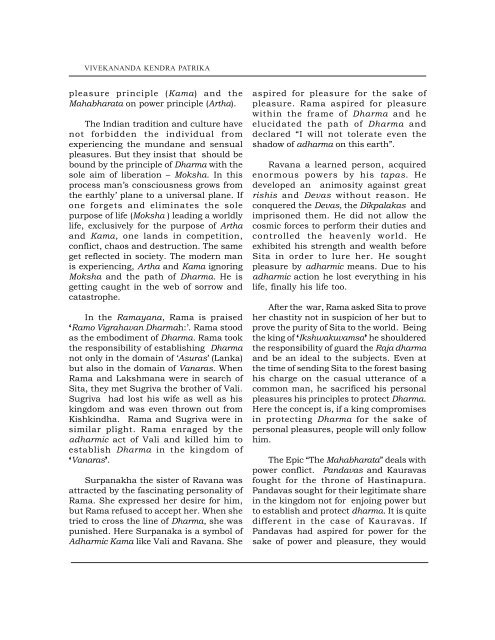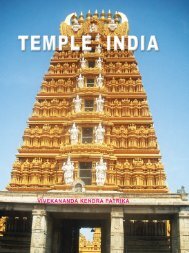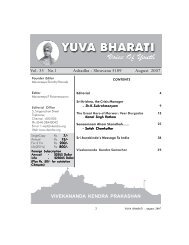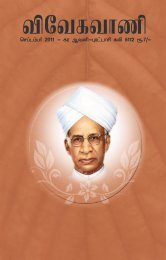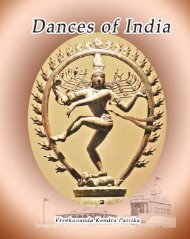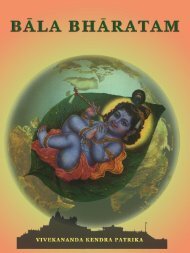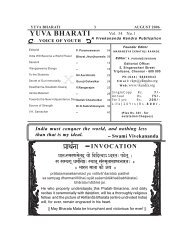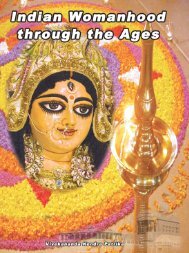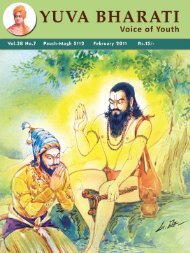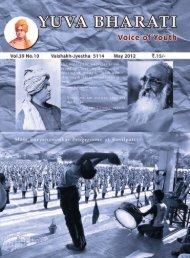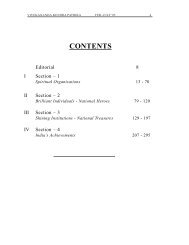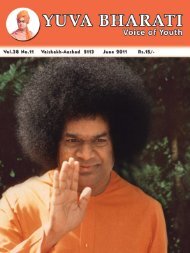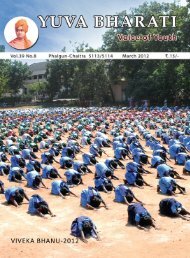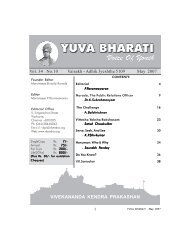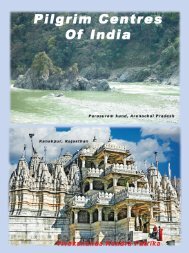Epics in Imprints-1.pdf - Vivekananda Kendra Prakashan
Epics in Imprints-1.pdf - Vivekananda Kendra Prakashan
Epics in Imprints-1.pdf - Vivekananda Kendra Prakashan
Create successful ePaper yourself
Turn your PDF publications into a flip-book with our unique Google optimized e-Paper software.
VIVEKANANDA KENDRA PATRIKA<br />
pleasure pr<strong>in</strong>ciple (Kama) and the<br />
Mahabharata on power pr<strong>in</strong>ciple (Artha).<br />
The Indian tradition and culture have<br />
not forbidden the <strong>in</strong>dividual from<br />
experienc<strong>in</strong>g the mundane and sensual<br />
pleasures. But they <strong>in</strong>sist that should be<br />
bound by the pr<strong>in</strong>ciple of Dharma with the<br />
sole aim of liberation – Moksha. In this<br />
process man’s consciousness grows from<br />
the earthly’ plane to a universal plane. If<br />
one forgets and elim<strong>in</strong>ates the sole<br />
purpose of life (Moksha ) lead<strong>in</strong>g a worldly<br />
life, exclusively for the purpose of Artha<br />
and Kama, one lands <strong>in</strong> competition,<br />
conflict, chaos and destruction. The same<br />
get reflected <strong>in</strong> society. The modern man<br />
is experienc<strong>in</strong>g, Artha and Kama ignor<strong>in</strong>g<br />
Moksha and the path of Dharma. He is<br />
gett<strong>in</strong>g caught <strong>in</strong> the web of sorrow and<br />
catastrophe.<br />
In the Ramayana, Rama is praised<br />
‘Ramo Vigrahavan Dharmah:’. Rama stood<br />
as the embodiment of Dharma. Rama took<br />
the responsibility of establish<strong>in</strong>g Dharma<br />
not only <strong>in</strong> the doma<strong>in</strong> of ‘Asuras’ (Lanka)<br />
but also <strong>in</strong> the doma<strong>in</strong> of Vanaras. When<br />
Rama and Lakshmana were <strong>in</strong> search of<br />
Sita, they met Sugriva the brother of Vali.<br />
Sugriva had lost his wife as well as his<br />
k<strong>in</strong>gdom and was even thrown out from<br />
Kishk<strong>in</strong>dha. Rama and Sugriva were <strong>in</strong><br />
similar plight. Rama enraged by the<br />
adharmic act of Vali and killed him to<br />
establish Dharma <strong>in</strong> the k<strong>in</strong>gdom of<br />
‘Vanaras’.<br />
Surpanakha the sister of Ravana was<br />
attracted by the fasc<strong>in</strong>at<strong>in</strong>g personality of<br />
Rama. She expressed her desire for him,<br />
but Rama refused to accept her. When she<br />
tried to cross the l<strong>in</strong>e of Dharma, she was<br />
punished. Here Surpanaka is a symbol of<br />
Adharmic Kama like Vali and Ravana. She<br />
aspired for pleasure for the sake of<br />
pleasure. Rama aspired for pleasure<br />
with<strong>in</strong> the frame of Dharma and he<br />
elucidated the path of Dharma and<br />
declared “I will not tolerate even the<br />
shadow of adharma on this earth”.<br />
Ravana a learned person, acquired<br />
enormous powers by his tapas. He<br />
developed an animosity aga<strong>in</strong>st great<br />
rishis and Devas without reason. He<br />
conquered the Devas, the Dikpalakas and<br />
imprisoned them. He did not allow the<br />
cosmic forces to perform their duties and<br />
controlled the heavenly world. He<br />
exhibited his strength and wealth before<br />
Sita <strong>in</strong> order to lure her. He sought<br />
pleasure by adharmic means. Due to his<br />
adharmic action he lost everyth<strong>in</strong>g <strong>in</strong> his<br />
life, f<strong>in</strong>ally his life too.<br />
After the war, Rama asked Sita to prove<br />
her chastity not <strong>in</strong> suspicion of her but to<br />
prove the purity of Sita to the world. Be<strong>in</strong>g<br />
the k<strong>in</strong>g of ‘Ikshwakuvamsa’ he shouldered<br />
the responsibility of guard the Raja dharma<br />
and be an ideal to the subjects. Even at<br />
the time of send<strong>in</strong>g Sita to the forest bas<strong>in</strong>g<br />
his charge on the casual utterance of a<br />
common man, he sacrificed his personal<br />
pleasures his pr<strong>in</strong>ciples to protect Dharma.<br />
Here the concept is, if a k<strong>in</strong>g compromises<br />
<strong>in</strong> protect<strong>in</strong>g Dharma for the sake of<br />
personal pleasures, people will only follow<br />
him.<br />
The Epic “The Mahabharata” deals with<br />
power conflict. Pandavas and Kauravas<br />
fought for the throne of Hast<strong>in</strong>apura.<br />
Pandavas sought for their legitimate share<br />
<strong>in</strong> the k<strong>in</strong>gdom not for enjo<strong>in</strong>g power but<br />
to establish and protect dharma. It is quite<br />
different <strong>in</strong> the case of Kauravas. If<br />
Pandavas had aspired for power for the<br />
sake of power and pleasure, they would


